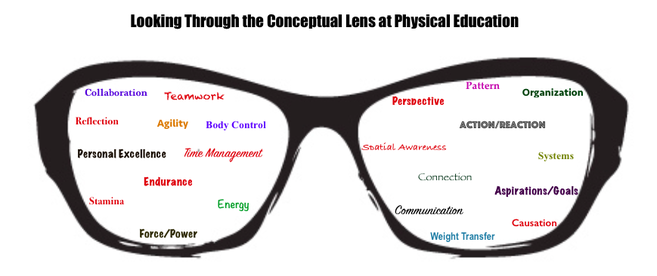|
Physical skill development in our PE programs is an absolute priority. Our students must be able to learn and demonstrate a mass of physical skills related to sport and movement in order to one day become physically literate individuals. I'd be surprised if any teacher had an argument against the importance of developing physical literacy in PE. However, the point of this blog post is not to argue the importance of physical literacy, but to question to what extent we are actually addressing conceptual learning in PE. As we plan the questions that we ask our students, the learning experiences they will be engaged in, the discussions that take place in class and the assessment tasks to be delivered, it is imperative to look through the conceptual lens of PE and identify which concepts are most worth exploring in the units being taught. These concepts will often transcend the specific units being taught and even the subject area of PE itself which is essential in helping students to understand these concepts at a much deeper level across the curriculum. When we become more conscious of our planning and think at a deeper level in regards to the experiences we offer our students, looking through this conceptual lens allows us to identify essential concepts that will drive all of the learning that happens in the units we teach in PE. At times we will find that the concepts we have chosen could also apply in other subject areas as well, therefore creating opportunities to authentically integrate learning across the curriculum. At this point, collaboration with classroom teachers takes on a whole new meaning as it's no longer all about the activities being done but more so about the conceptual learning taking place.
Co-Construction of Conceptual Questions Collaboration time with classroom teachers can be made so much more meaningful when teachers sit down to co-construct the conceptual questions to be used in the classroom and in PE. The idea is that the same conceptual questions can be used in both the classroom setting and in PE thus reinforcing and deepening the learning that takes place with our students. When the classroom teacher and PE teacher can identify concepts that apply in both the unit happening in the classroom and the unit happening in PE, it is the perfect time to co-construct questions to be used that address these concepts. As these conceptual questions are being explored in PE, the students will be engaged in activities, games, and tasks that help to develop the physical skills necessary to be addressed in the units being taught. Taking on this conceptual focus does not mean that opportunities to explore and develop physical skills will be watered down and made less meaningful in the process of learning. I believe that the entire learning process is enhanced by bringing more of a conceptual focus to our teaching regardless of the subject area being taught. Two questions to reflect on as you finish reading this post: A) How do you address conceptual learning in your PE program? B) What opportunities exist for you to make more meaningful and relevant conceptual connections across the curriculum?
1 Comment
Brooke
2/27/2019 11:32:51 pm
Hey Andy,
Reply
Leave a Reply. |
AuthorKAUST Faculty, Pedagogical Coach. Presenter & Workshop Leader.IB Educator. #RunYourLife podcast host. Archives
September 2022
|
- Welcome
- All Things Teaching and Learning
- The Aligned Leader Blog
- Consulting and Coaching Opportunities
- My TED X Talk
- My Leadership Blog
- Run Your Life Podcast Series
- How PYP PE with Andy Has Helped Others
- Good Teaching is L.I.F.E
- The Sportfolio
- Example Assessment Tasks
- PYP Attitude Posters (printable)
- Publications

 RSS Feed
RSS Feed
